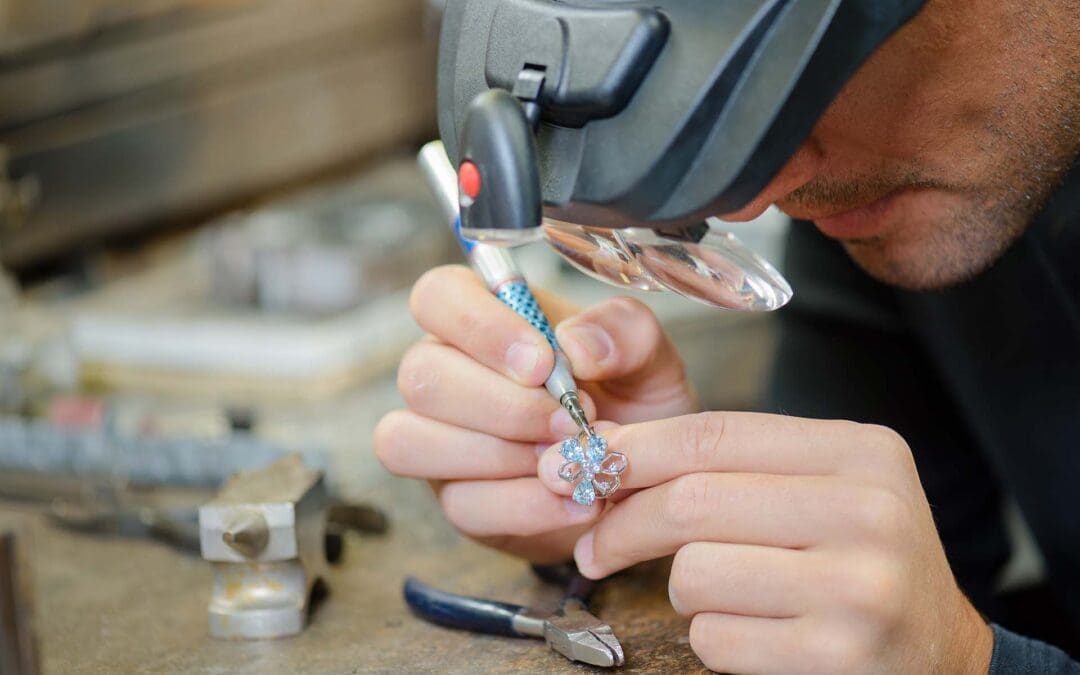Outsourcing jewelry repair services is a practice where jewelry retailers, designers, or manufacturers delegate the repair and maintenance of jewelry pieces to specialized external service providers. This approach has gained popularity for several reasons:
1. Cost Efficiency:
- Outsourcing can be more cost-effective for smaller jewelry businesses or those without the volume to justify an in-house repair team. By outsourcing, they can avoid the overhead costs associated with maintaining a full-time jeweler or repair technician.
2. Access to Specialized Skills:
- Jewelry repair often requires specialized skills, such as stone setting, polishing, or soldering. Outsourcing allows businesses to access highly skilled craftsmen who are experts in specific types of repairs, ensuring high-quality work without the need for extensive in-house training or equipment.
3. Scalability:
- During peak seasons, like the holiday period or post-engagement season, the volume of repair requests can increase significantly. Outsourcing provides flexibility, allowing businesses to scale their repair capacity up or down based on demand without committing to permanent staff.
4. Focus on Core Business:
- By outsourcing repairs, jewelry businesses can focus more on their core activities, such as design, sales, and customer service. This can lead to better overall efficiency and customer satisfaction, as the business can concentrate on what it does best while leaving the repairs to specialists.
5. Quality Assurance:
- Reputable jewelry repair services often have rigorous quality control processes. Outsourcing to these providers can ensure consistent, high-quality repairs, which is crucial for maintaining customer trust and satisfaction.
6. Turnaround Time:
- Outsourced repair services often have streamlined processes and can handle high volumes, which can result in faster turnaround times compared to in-house repairs. This can be a significant advantage in meeting customer expectations for quick service.
7. Risk Management:
- Repairing jewelry, especially valuable pieces, carries inherent risks. Outsourcing to experienced professionals reduces the likelihood of damage or loss, and many third-party repair services are insured, providing an additional layer of protection for the business.
Considerations:
- Vendor Selection: It’s important to carefully select a reputable outsourcing partner with a track record of quality workmanship and reliability.
- Cost vs. Control: Outsourcing may mean less control over the repair process and timelines, so it’s essential to establish clear communication and expectations with the service provider.
- Customer Perception: Some customers may prefer repairs to be done in-house, so transparency about the outsourcing process and ensuring confidentiality can be important.
Overall, outsourcing jewelry repair services can be a strategic decision for many jewelry businesses, offering flexibility, access to expertise, and potential cost savings. However, it requires careful management to ensure the quality and reliability of the repairs meet the business’s standards.
Questions to Ask a Potential Outsourced Jewelry Repair Provider
When considering outsourcing jewelry repair services, a jeweler should ask the following questions to ensure they choose a reliable and skilled provider:
What are your areas of expertise?
What is your experience with different materials?
Can you provide references or examples of past work?
What are your turnaround times for different types of repairs?
- Understanding their standard turnaround times for different types of repairs is essential to manage customer expectations and ensure timely service.
- Follow up with a question about how you will know when turnaround times change
What is your pricing structure?
Ask for a detailed breakdown of their pricing for various repair services. This will help you compare costs and determine if their rates are competitive and within your budget.
How do you handle delicate or high-value pieces?
- Inquire about their procedures for handling and repairing delicate or high-value items, including their security measures and insurance coverage. This ensures that valuable pieces are protected throughout the repair process.
- Find out how transportation will work, what value thresholds apply to different modes or methods of transportation and consider how insurance coverage applies to the different transportation options so that your business is protected for all solutions.
- Consider your business insurance policy and determine if you need to contact your insurance provider to discuss coverage for transportation and working with outsource providers in this way in case of a loss.
Do you offer a warranty or guarantee on your repairs?
Check if they provide a warranty or guarantee on their repair work. A warranty can give you and your customers peace of mind regarding the quality and durability of the repairs and certainty for your business on costs if there is a quality problem.
What is your process for quality control?
- Ask about their quality control processes to ensure that all repairs meet high standards before being returned to you. This might include inspections, testing, or final polishing.
- Understand the cost of any optional aspects of the process.
How do you handle communication and updates during the repair process?
- Clear communication is key. Ask how they will keep you informed about the status of repairs, any issues that arise, or if there are any delays. Some providers use a web portal to communicate. Others focus on communication via email or text messages.
- Make sure the way you and your team will interact with the provider are compatible with how you and your team do business.
What is your policy on confidentiality and customer privacy?
Since you're outsourcing customer-owned items, it's important to know how they handle confidentiality and privacy. Ensure they have policies in place to protect your clients' information and the security of their jewelry.
How do you manage high-volume orders or rush jobs?
If you anticipate periods of high volume or need the flexibility for rush repairs, ask how they manage these situations and whether they can accommodate your needs.
What are your shipping and handling procedures?
- [See also the High Value related question]
- Discuss how items will be shipped to and from their location, including packaging standards, insurance during transit, and who is responsible for shipping costs.
Do you provide detailed documentation for each repair?
- Detailed documentation, including what repairs were performed, materials used, and any issues encountered, is important for record-keeping and transparency with your customers.
- Consider how your business will store and track this information and if it needs to be kept as part of customer records in the future in the CRM used by the business.
How do you handle repairs that don’t meet expectations?
Inquire about their policies for handling repairs that might need adjustments or don’t meet your standards. This could include revisions, refunds, or additional work at no extra cost.
Are you insured, and what does your insurance cover?
Ensure that the provider has insurance to cover potential loss, damage, theft, interruption of business, and impacts to your business for items while they are in their care. This is especially important for high-value pieces.
Asking these questions will help you thoroughly vet potential jewelry repair outsourcing providers, ensuring they meet your quality, security, and customer service standards.


